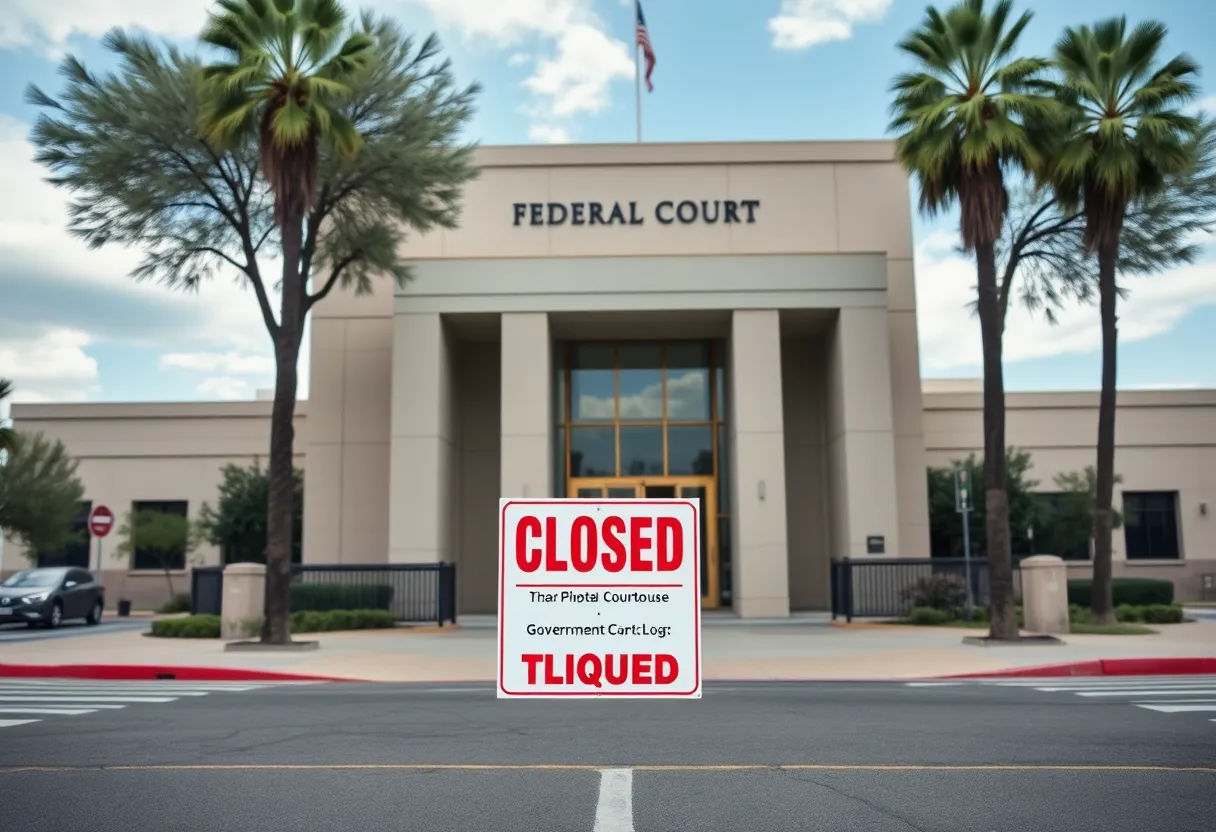Tucson, AZ, October 18, 2025
Federal courts in Tucson are functioning with minimal staff due to the ongoing government shutdown. Essential personnel are on duty, leading to postponed hearings and restricted public access to court facilities. This has created immediate disruptions for ongoing legal proceedings, with warnings of significant backlogs once normal operations resume. Many court activities have been significantly scaled back, affecting both litigants and attorneys during this challenging time.
Tucson, AZ Breaking News: Federal Courts in Tucson Operate on Skeleton Staff Amid Government Shutdown
TUCSON, AZ (October 18, 2025) – Federal courts in Tucson are running with a drastically reduced workforce as the government shutdown continues into its second week. Only essential personnel remain on duty, causing numerous hearings to be postponed and severely limiting public access to court facilities. This situation has created immediate disruptions for ongoing legal proceedings, with officials warning of significant backlogs once regular operations resume.
The shutdown, now affecting multiple federal agencies nationwide, has forced the U.S. District Court for the District of Arizona in Tucson to prioritize only the most critical functions. Essential staff, including those handling detainee matters and emergency security, are the only ones required to report for work without pay during this period. Routine operations, such as civil case filings and non-urgent criminal hearings, have been halted, leaving many litigants and attorneys in limbo.
Impact on Court Operations
Court activities have been scaled back to the bare minimum to comply with federal guidelines during the funding lapse. Hearings for initial appearances, detention decisions, and other matters involving individuals in custody are proceeding as scheduled to ensure public safety and legal protections. However, grand jury sessions, trials, and most civil proceedings have been rescheduled, potentially delaying resolutions for weeks or months.
Public access to the courthouse has been restricted, with visitors advised to check case status online or contact the clerk’s office for updates. This limitation affects not only local residents but also attorneys, witnesses, and families involved in federal cases. The reduced staffing means longer wait times for basic inquiries and slower processing of documents, compounding frustrations for those navigating the justice system.
Warnings of Future Backlogs
With the shutdown showing no immediate signs of resolution, court administrators have highlighted the risk of mounting case backlogs. Once Congress restores funding, the influx of postponed matters could overwhelm the already strained resources of the Tucson federal court. This backlog may lead to extended timelines for case dispositions, increased costs for all parties involved, and further delays in delivering justice.
Legal experts anticipate that the most affected areas will include immigration cases, which form a significant portion of the court’s docket in Arizona, as well as environmental and civil rights litigation tied to the region’s unique issues. The prolonged uncertainty is particularly challenging for defendants awaiting trial and plaintiffs seeking timely remedies.
Broader Context of the Shutdown
The government shutdown stems from unresolved budget disputes in Congress, halting non-essential operations across federal branches. In Arizona, this has ripple effects beyond the courts, impacting national parks, border security operations, and federal employee services. For Tucson, a city with a high volume of federal cases due to its proximity to the U.S.-Mexico border, the shutdown exacerbates existing pressures on the judicial system.
Past shutdowns have shown similar patterns, with courts eventually recovering but at the cost of efficiency. During the 2018-2019 shutdown, which lasted 35 days, federal courts nationwide faced comparable challenges, leading to over 13,000 postponed jury trials and a surge in administrative work upon reopening. Current projections suggest this event could follow a similar trajectory if not addressed swiftly.
Guidance for Affected Parties
Individuals with scheduled court appearances are urged to monitor official updates through the court’s website or by calling the clerk’s office. Attorneys are adapting by filing motions electronically where possible and preparing for potential rescheduling. The focus remains on maintaining continuity for essential services while bracing for the aftermath.
As the situation evolves, the Tucson federal courts continue to operate under constrained conditions, underscoring the broader implications of federal funding interruptions on local justice delivery. This development highlights the interconnectedness of national policy decisions and community-level legal access.
FAQ
What is the current status of federal courts in Tucson?
Federal courts in Tucson are operating on minimal staff due to the ongoing government shutdown. Only essential personnel are on duty, leading to postponed hearings and limited public access.
Which court functions are still active during the shutdown?
Critical cases, like detentions, continue but with limited resources.
What disruptions are occurring at the Tucson federal courts?
Numerous hearings have been postponed, and public access to court facilities is severely limited.
What long-term effects are expected from the shutdown?
Officials warn of significant backlogs once funding resumes, potentially delaying case resolutions for weeks or months.
How can people check on their court cases during this period?
Affected parties should monitor official court updates online or contact the clerk’s office, as routine operations are halted.
Key Features of Federal Court Operations During the Shutdown
| Feature | Description |
|---|---|
| Staffing Level | Minimal; only essential personnel on duty |
| Active Functions | Critical cases like detentions continue |
| Disruptions | Postponed hearings and limited public access |
| Future Risks | Significant backlogs expected once funding resumes |
| Affected Location | Tucson federal courts |
Deeper Dive: News & Info About This Topic
HERE Resources
Federal Judge Allows Local Murder Trial to Proceed in Tucson
Federal Judge Upholds Controversial Border Security Law in Tucson
Tucson Judge Rejects Challenge to Arizona’s Border Security Law
Federal Decision on Wage Cuts for Legal Foreign Farmworkers Sparks Controversy




